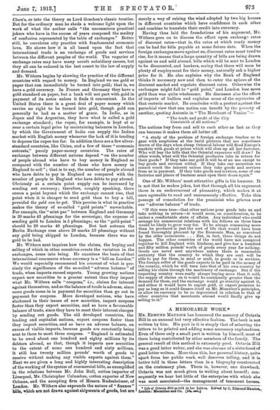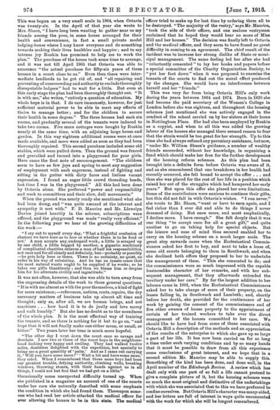A MEMORABLE WORK.*
Ma. EDMUND MAITIIICE has honoured the memory of Octavia Hill in an unusual but very effective fashion. The book is not written by him. His part in it is simply that of selecting the letters to be printed and adding some necessary explanations. Even of these only a small part is written by himself, most of them being contributed by other members of the family. The general result of this method is extremely good. Octavia Hill was a good letter writer, and she was also one of a sisterhood of good letter writers. More than this, her personal history, quite apart from her public work, well deserves telling, and it is better told in these letters than in a biography constructed on the customary. plan. There is, however, one drawback. Octavia was not much given to writing about herself; con- sequently we hear but little of the enterprise with which she was most associated—the management of tenement houses.
• Lila of Octavio Hill co told in her Letters. L414d by C. Edmund Maurice%) London • Idacmillan and Co. [16a. TAW
This was begun on a very small scale in 1864, when Octavia was twenty-six. In the April of that year she wrote to Mrs. Sheen, " I have long been wanting to gather near us my friends among the poor, in some house arranged for their health and convenience, in fact a small private model lodging-house where I may know everyone and do something towards making their lives healthier and happier ; and to my intense joy Ruskin has promised to help me to work the plan." The purchase of the house took some time to arrange, and it was not till April 1865 that Octavia was able to announce "the actual purchase for fifty-six years of three houses in a court close to us." Even then there were inter- mediate landlords to be got rid of, and " all repairing and preventing of overcrowding and authority to exclude thoroughly disreputable lodgers" had to wait for a little. But even at this early stage the plan had been thoroughly thought out. " It
is with me," she writes, "entirely a question of education. My whole hope is in that. I do care immensely, however, for just sufficient material power to be able to meet any efforts of theirs to manage better ; and for the children to secure their health in some degree." The three houses had each six
rooms, and gradually several of the tenants were induced to take two rooms. Five more cottages were bought by Ruskin nearly at the same time, with an adjoining large house and garden. In this way eighteen additional rooms were at once made available, and more were added as soon as they had been thoroughly repaired. This second purchase included some old stables, which were pulled down. Then the ground was fenced
and gravelled and turned into a playground for poor girls. Here came the first note of encouragement. "The children seem to have so few joys and spring to meet any suggestion of employment with such eagerness, instead of fighting and sitting in the gutter with dirty faces and listless vacant expression. I found an eager little crowd threading beads, last time I was in the playground." All this had been done by Octavia alone. She preferred "power and responsibility and work to committees and their slow, dull movements."
When the ground was nearly ready she mentioned what she had been doing, and " was quite amazed at the interest and sympathy it met with." F. D. Maurice and Mr. Llewelyn Davies joined heartily in the scheme, subscriptions were offered, and the playground was made " really very efficient." In the following year we hear of the growing difficulties of the work :—
" I cry out to myself every day, What a frightful confusion of chances we have here as to how or whether there is to be food or not.' A man accepts any:underpaid work; a little is scraped up by one child, a little begged by another, a gigantic machinery of complicated charities relieves a man of half his responsibilities, not once and for all clearly and definitely, but—probably or possibly —he gets help here or there. There is no certainty, no quiet, no order in his way of subsisting. And he has an innate sense that his most natural wants ought to be supplied if he works ; so he takes our gifts thanklessly ; and then we blame him or despise him for his alternate civility and ingratitude."
It was not often, however, that she was able to turn away from the engrossing details of the work to these general questions. "It is with me almost as with the poor themselves, a kind of fight for mere existence; —references, notices, rents, repairs, the dry necessary matters of business take up almost all time and thought; only as, after all, we are human beings, and not machines . . . how hard it is to do justly and love mercy and walk humbly." But she has no doubt as to the soundness of the whole plan. It is the most effectual way of training the tenants, and so there is nothing for it but to go on, "and hope that it will not finally make one either mean, or small, or
bitter." Two years later her tone is much more hopeful.
"The other day I went down the court once so savage and desolate. I saw two or three of the worst boys in the neighbour- hood looking very happy and smiling. They had walked twelve miles, doubtless delighted with the expedition, but specially to bring me a great quantity of palm.' And as I came out carrying it, Will you have some more P' Wait a bit and have some more,' they cried. When I remembered that these same boys had been our greatest trouble, defying authority, climbing walls, breaking windows, throwing stones, with their bands against us in all things, I could not but feel that we had got on a little."
Occasionally some unexpected difficulty turned up. When she published in a magazine an account of one of the courts under her care she naturally described with some emphasis
the condition in which she had found them. Thereupon some- one who had read her article attacked the medical officer for
ever allowing the houses to be in this state. The medical
officer tried to make up for lost time by ordering them all to be destroyed. " The majority of the vestry," says Mr. Maurice, "took the side of their officer, and one zealous vestryman exclaimed that he hoped they would hear no more of Miss Hill and her houses." The decision was finally left to Octavia and the medical officer, and they seem to have found no great difficulty in coming to an agreement. The chief result of the incident was to increase her strong dislike of State or muni- cipal management. The same feeling led her after she bad "reluctantly consented" to lay her books and papers before a special committee of the Charity Organization Society, to " put her foot down " when it was proposed to examine the tenants of the courts to find out the moral effect produced by the changes. She would have no interference between herself and her "friends."
This was very far from being Octavia Hill's only work during the years between 1864 and 1874. Born in 1833 she had become the paid secretary of the Women's College in London before she was eighteen, and throughout the housing schemes just mentioned sbe was actively engaged in the conduct of the school carried on by her sisters at their home in Nottingham Place. She had also been employed by Ruskin as a copyist, and when to all this was added the growing labour of the houses she managed there seemed reason to fear that the strain would be too great for her strength. Up to this time she had always refused any pecuniary assistance, but now, "under Mr. William Shaen's guidance, a number of wealthy friends succeeded, without her knowledge, in organizing a fund which should make her free for the further development of the housing reform schemes. As this plan had been brought into a definite form before Octavia was aware of it, and as she remembered that one breakdown in her health had recently occurred, she felt bound to accept the offer . . . and thus she was placed for the rest of her life in a position which raised her out of the struggles which had hampered her early years." But upon this offer she placed her own limitations. Some of the contributors were anxious to continue their gifts, but this did not fall in with Octavia's wishes. "I can never," she wrote to Mr. Shaen, "want or have to earn again, and I feel richer than I ever did and able to do things I never dreamed of doing. But once more, and most emphatically, I decline more. I have enough." She felt deeply that it was one thing "to accept once for all a great gift," and quite another to go on taking help for special objects. But the leisure and ease of mind thus secured enabled her to carry on the housing scheme on a much larger scale. The great step onwards came when the Ecclesiastical Commis- sioners asked her first to buy, and next to take a lease of, some old courts belonging to them in Southwark, and when she declined both offers they proposed to her to undertake the management of them. " This she consented to do; and the commissioners were so much impressed with the capable businesslike character of her remarks, and with her sub- sequent management, that they afterwards extended the territory under her care." By far the largest addition to her labours came in 1901, when the Ecclesiastical Commissioners asked her to take charge of more of their property, on the leases falling in, in Southwark and Lambeth; and, shortly before her death, she provided for the continuance of her work by gaining the consent of the commissioners and of five other owners of house property to the appointment of certain of her trained workers to take over the direct management of the houses committed to her care. We should like to have had from some of those associated with Octavio, Hill a description of the methods and an appreciation of the results of the enterprise to which she gave up so large a part of her life. It has now been carried on for so long a time under such varying conditions and by so many hands that it must be possible to draw from all this experience some conclusions of great interest, and we hope that in a second edition Mr. Maurice may be able to supply this. Something of' the kind has boen done, and done well, in the April number of the Edinburgh Review. A review which has dealt only with one part of so full a life cannot pretend to give a complete picture of it, but the housing schemes were so much the most original and distinctive of the undertakings with which she was associated that to this we have preferred to confine ourselves. But Octavia Hill's character was many-sided, and her letters are full of interest in ways quite unconnected with the work for which she will be longest remembered.















































 Previous page
Previous page